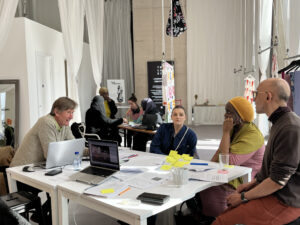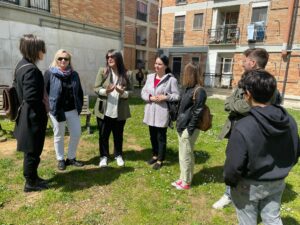
We are delighted that the UK Erasmus+ National Agency has awarded Rinova’s Motivate to Create (M2C) ‘Good Practice’ exemplar status. This is our fifth such accolade from Erasmus+ UK. It is only conferred, after assessment, by Europe’s National Agencies on the very highest performing Erasmus Plus KA2 Co-operation Partnerships.
For Rinova Ltd, we take the learning from one of our final UK Erasmus+ experiences into our new 3-year Adult Education Budget, Jobs and Skills for Londoners provision with the Greater London Authority – and our new Turing Scheme international mobilities programme, as well as into our growing EU work programme from Rinova Málaga.

The M2C multiplier event in London (April, 2023)
M2C built the capacity of 56 community facilitators and leaders from five countries, activists for change in their local neighbourhoods and regions, who pooled their experience and expertise in co-creating and testing a series of learning activities, tools, resources and courses. We engaged with over 400 learners in extended networks in London, Rijeka, Matera, Barcelona and Bratislava – and some 270 organisations and stakeholders came to our various ‘mutliplier events’ where we shared information and learning about M2C.
As we reported in previous blogs and at our launch, M2C built upon the idea of “Social Action Projects” (SAPs), which originated in London as an innovative element of our Head2Work programme under the GLA’s ESF 2014-20 co-financing programme. Head2Work provided over 150 young Londoners aged 18-25 with employability support and preparatory training for the world of work. They also gained skills through working together on SAPs. These ranged from making videos raising awareness of their experience of being homeless, or of how they coped with the pandemic, to completely refurbishing and redecorating a communal space within their hostel in East London.
Thanks to Erasmus+ we were able to test out arts-led SAPs at the European level. Together with Rosetta Arts, UK; Association CEPS, Spain; Urbani Separe, Croatia; Materahub, Italy and RDA, Slovakia), we combined the Head2Work SAP concept with the traditions and values of Europe’s community and participatory arts practice.
One of the key aims of M2C was to develop a common approach to organising arts-based SAPs rooted in inclusive community development practice. It began by asking ”What is a Social Action Project?”, framing M2C’s approach to arts-led SAPs. Who do they involve? How are SAPs delivered? What’s the added value of SAPs? Why use this methodology?

The M2C project partners meeting in Matera, Italy (April, 2023)
Inspired in part by the challenges arising from the profound impact of the Covid crisis, M2C aimed to help overcome isolation experienced by cultural and creative practitioners. Its focus on arts-led non-formal adult education in local communities through SAPs was a means for fostering participatory and intercultural dialogue and inclusion. Through the Erasmus+ framework, M2C offered a transnational group of artists and community facilitators working in place-based neighbourhood renewal opportunities to come together in a Community of Practice to reflect on and exchange ways of working and consider how to rebuild the creative and cultural sector for the better – in a way that benefits more people and places.
This has resulted in four online modules, arising from direct and online consultations in the five countries and intensive workshops at a three-day event attended by 16 community leaders in Barcelona. The four modules cover Engagement; Frameworks for arts-led Social Action; Leadership and Social Change; and Reflecting on Learning and include case studies of arts-led SAPs across the five countries. Community Facilitators were invited to contribute practical tips, tools and methods for organising arts-led social action and managing group dynamics, which have been compiled in an accessible multilingual M2C Pocket Guide.
All the M2C results and resources are freely available online in five languages – as well as archived news and information about the partnership – at www.motivatetocreate.eu
The M2C Community of Practice has shown how, using digital communications tools combined with real-time and place meetings, workshops and study visits, transnational exchange of learning among community facilitators and community leaders can strengthen the diversity and resilience of the sector post-pandemic. An important impact was the recognition amongst community facilitators of their role as adult educators and their improved capacity in supporting adult learning.
 The European Commission support for the production of this publication does not constitute an endorsement of the contents which reflect the views only of the authors, and the Commission cannot be held responsible for any use which may be made of the information contained therein.
The European Commission support for the production of this publication does not constitute an endorsement of the contents which reflect the views only of the authors, and the Commission cannot be held responsible for any use which may be made of the information contained therein.


